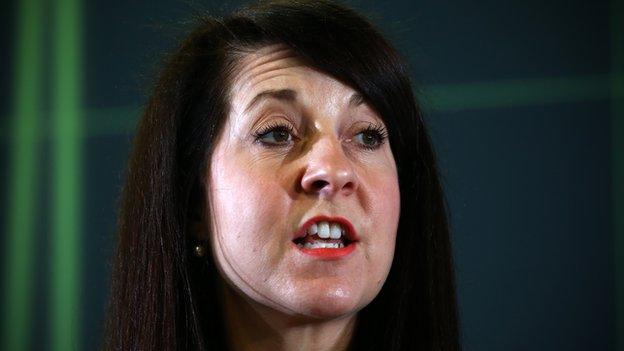Harriet Harman warning over Labour 'blame game'
- Published
Harriet Harman: "It was a very bad defeat, there's no getting away from that"
Acting Labour leader Harriet Harman has said there should be "no blame game" in the wake of its election defeat.
She told the BBC that Labour must do its job of holding the government to account while avoiding "scapegoating".
She was speaking after ex-chancellor Alistair Darling became the latest figure to attack the party's direction under former leader Ed Miliband.
He said the party had "no economic strategy" and had failed to defend its record in government properly.
Ed Miliband stood down on Friday after Labour failed to regain power, ending up with 26 fewer seats than in 2010.
On Sunday, Liz Kendall became the first candidate to confirm she was entering the race to succeed him and others - including potentially Chuka Umunna, Tristram Hunt, Andy Burnham and Yvette Cooper - are expected to enter the fray in the coming days.
However, both Dan Jarvis and David Lammy have ruled themselves out of the contest.
In other Labour news:
There is a mini-reshuffle of Labour's frontbench after key figures, including Ed Balls and Douglas Alexander lost their seats
Lord Sugar quits the party saying he has "lost confidence" in its support for business
MP Simon Danczuk has told the Sun he wants to be Labour's deputy leader
Harriet Harman said the party had suffered a "very bad" defeat and she had commissioned research into its performance in different parts of the countries so the post-mortem could "be based on the actual facts rather than anecdotes".
Ms Harman, who will address members of the Parliamentary Labour Party later at its first meeting since the election, urged the party to pull together and refrain from recriminations.
In recent days, leading Blairites such as Lord Hutton and Lord Mandelson have questioned the party's direction under Mr Miliband, suggesting he had made a "terrible mistake" in moving away from the territory occupied by Tony Blair and Gordon Brown.
But Ms Harman said the party should not "jump to conclusions" about why it had done so badly.
"We have to have a proper analysis rather than scapegoating and 'blame gaming'," she told BBC Breakfast. "It is my responsibility to make sure we have a debate which is illuminated by the facts rathern than people just grinding axes".
She added: "At the same time we need to be electing a new leader and we are doing that under new rules because Ed Miliband changed the rules."
While she was temporary leader, Ms Harman said she would make sure the government was held to account for the "whole load of promises" it had made during the election campaign.
"We are not going to go away and let them do whatever they want. It is a very important role".

Labour election rules
MPs wishing to stand as leader and deputy leader have to be nominated by 15% of their colleagues in the Parliamentary Labour Party to be eligible to stand.
As Labour now has 232 MPs, this means prospective candidates must get at least 35 signatures.
Under rules agreed last year, all Labour Party members, registered supporters and affiliated supporters - including union members - will be allowed a maximum of one vote each on a one member, one vote system.
When the election is held, they will be asked to rank candidates in order of preference.
If no candidate gets 50% of all votes cast, the votes will be added up and the candidate with the fewest votes eliminated. Their second preference votes will then be redistributed until one candidate has 50% of all votes cast.

Mr Darling, who did not contest the election, suggested that Labour was in a worse position than when it lost the 1992 election.
"We did not have an economic policy," he told the BBC. "We didn't repudiate the criticisms the Tories were making of when we were in government.
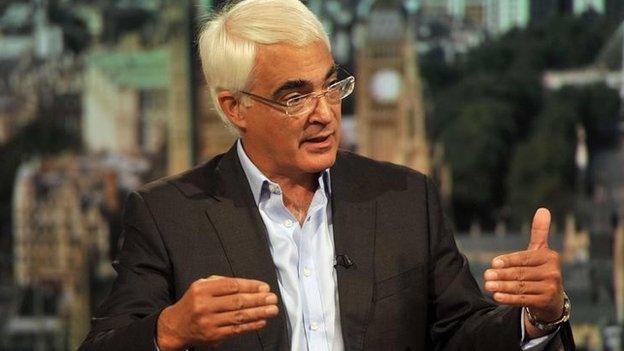
Alistair Darling said Labour had failed to defend its record in government
"They were occasions when we almost said we didn't do any good in 13 years, which is absolute rubbish.
"You've got to have confidence about what you did in the past just as the courage to admit where you got things wrong - but we just didn't look compelling and convincing."
Mr Darling said he favoured a long leadership contest so the party could determine not only who would take it forward but what it should be arguing for against a majority Tory government.
"An awful lot of people being talked about now were only elected five years ago and you've got to see where they stand."
'Family life'
Mr Jarvis, who served in Kosovo, Iraq and Afghanistan before resigning his commission and entering politics in 2011, had been touted as a possible leadership contenders by some of his fellow MPs.
However, in an article for the Times, he confirmed he would not be putting his name forward.
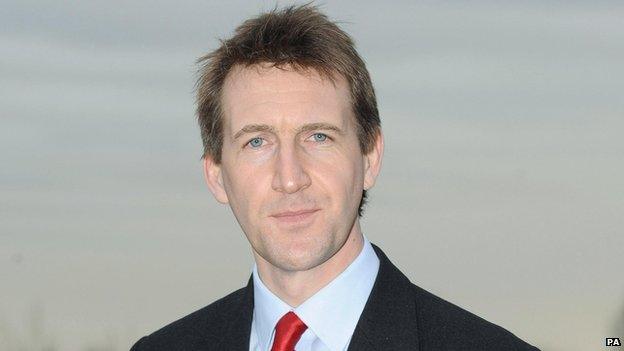
Mr Jarvis said Labour was stuck in a "comfort zone"
"I'm ready to serve in that rebuilding process as part of the Labour team. But I can't do that as leader at this moment," he wrote.
Mr Jarvis, whose first wife died in 2010 and who has a young family, said it was "not the right time" for him or them.
"My eldest kids had a very tough time when they lost their mum and I don't want them to lose their dad. I need some space for them, my wife and our youngest child right now, and I wouldn't have it as Leader of the Opposition."
But he said Labour, had to "move out of the comfort zone of critiquing the Tories" and offer an alternative.
Labour, he suggested, had to reconnect with the public, pointing out that, excluding London, "more people have walked on the moon than the number of Labour MPs elected across the South West, South East and East of England".
He also said Labour was facing increasing challenges in its traditional northern heartlands.
"Labour began this Parliament leading the debate about devolving power away from Westminster. It ended it having allowed George Osborne to steal our clothing with talk of a Northern Powerhouse."
- Published11 May 2015
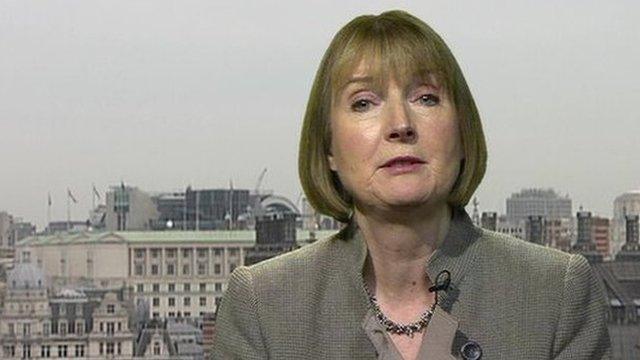
- Published11 May 2015
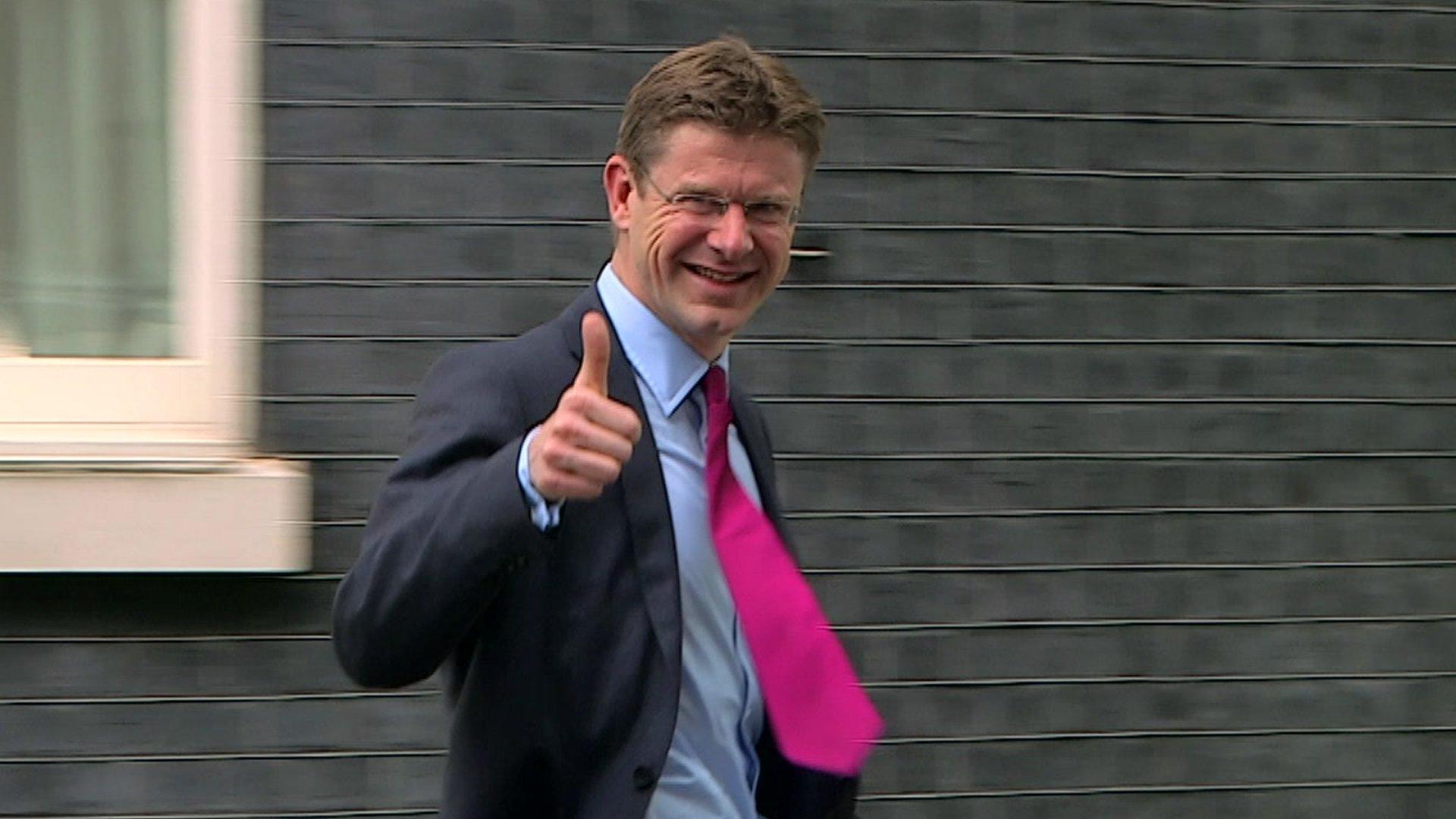
- Published10 May 2015
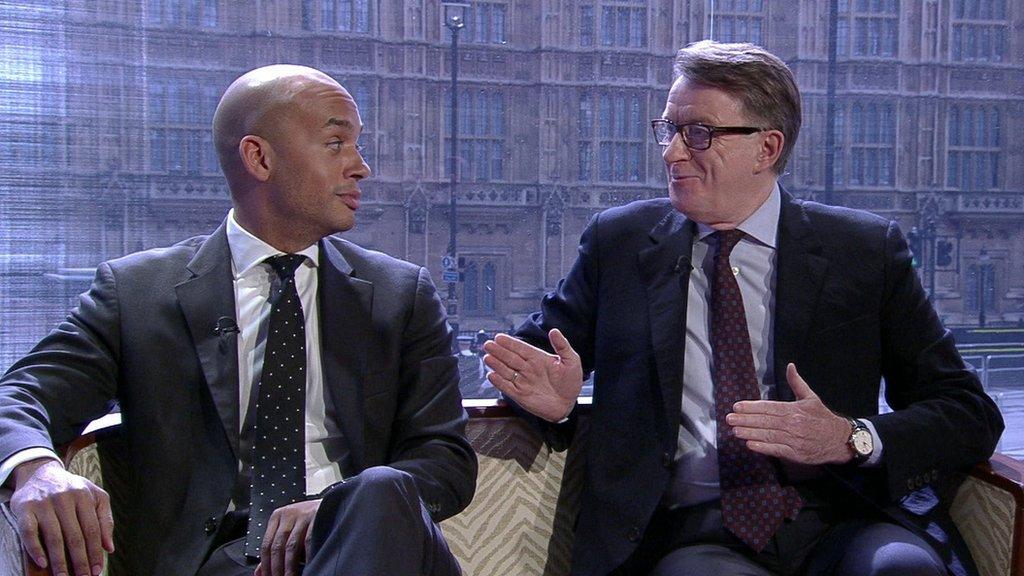
- Published10 May 2015
